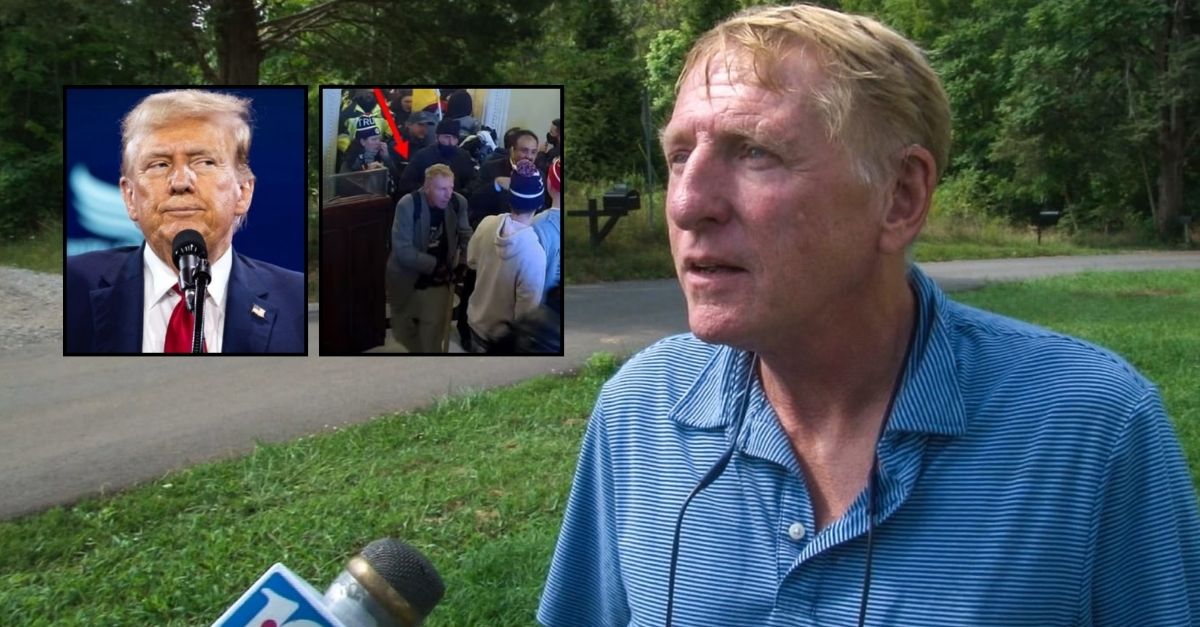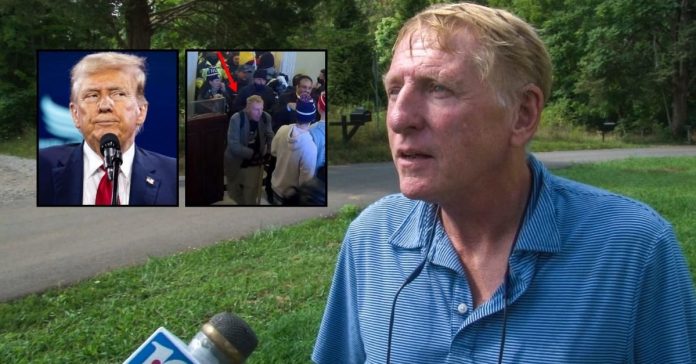
Background: Clifford Meteer speaks to local media in Knoxville, Tenn., about his Jan. 6 case (WBIR). Inset left: Donald Trump speaks at the annual Road to Majority conference in Washington, DC, in June 2024 (Allison Bailey/NurPhoto via AP). Inset right: Clifford Meteer inside the U.S. Capitol Building on Jan. 6, 2021, according to the Department of Justice (DOJ).
On the same day a federal judge in Baltimore applied President Donald Trump’s mass pardon for Jan. 6 defendants to a man’s gun charge, another in Tennessee did the exact opposite — denying a man’s request for the Trump treatment in a firearms case that he blasted as being “entirely unrelated” to the 2021 insurrection.
“Ultimately, the court finds that the plain language of the pardon limits its scope to offenses related to actions taken on January 6, 2021, at the U.S. Capitol, and such language is not broad enough to include entirely unrelated firearms possession offenses, on a different date, in a different location, simply because the offense was discovered during an investigation into the defendant’s conduct on January 6, 2021, at the Capitol,” wrote U.S. District Judge Thomas A. Varlan in a June 6 order.
Defendant Clifford Meteer was sentenced in 2022 to 60 days in prison, 36 months probation and 60 hours of community service for entering the Capitol on Jan. 6. Meteer got hit with four charges related to his actions that day and pleaded guilty to one count of parading, demonstrating or picketing in the Capitol building. He reportedly described himself in the past as “one of those idiots scaling the wall,” according to NBC News.
Prosecutors had argued in Meteer’s sentencing memo that he should serve 75 days in prison followed by three years probation because of his “total lack of remorse” and prior criminal history, WBIR reported. He served his time at a prison facility in Kentucky and was later granted clemency under Trump’s pardon order in January.
Meteer was arrested on a felony gun charge after federal authorities indicted him and took him into custody in July 2021. The arrest was in Knoxville, approximately 485 miles away from Washington.
In his ruling, Varlan — a George W. Bush appointee — poked numerous holes in Meteer’s arguments for dismissing his gun case under Trump’s executive order, saying Meteer misinterpreted multiple words and phrases from the order.
“The ordinary meaning of the term ‘near,’ defined as ‘close at hand’ and ‘not distant,’ could not be understood to encompass, for example, all events occurring within the District of Columbia,” the judge explained. “Nor could ‘near’ be read to include events occurring in an entirely different state.”
Varlan wrote that he agreed with arguments from Meteer and his legal team that the Baltimore case involving Jan. 6 defendant Elias Costianes, which was dismissed by U.S. District Judge James K. Bredar — a Barack Obama appointee — involves “near-identical” facts to his case. But Bredar was required to approve Costianes’ request after both parties in the case complied with the correct rule of federal civil procedure.
The same determination was apparently not made for Meteer.
“The parties have provided no case law that would support a finding that defendant’s offense in this case would fall within the scope,” Varlan concluded.
“And the court’s independent review of cases from around the country only supports a finding that unrelated offenses discovered during the investigation of January 6 activity do not fall within the scope of the pardon,” he said. “Indeed, the court has located no apparent decision in any case in a post-conviction setting where any court has granted a defendant relief under the pardon under these circumstances.”
Varlan made a similar ruling earlier this year when he declined to toss convictions for Jan. 6 defendant Edward Kelley, of Maryville, Tennessee, who had asked to get a conviction for leading a separate plot to kill FBI agents thrown out.

